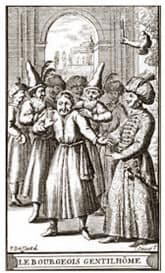The Bourgeois Gentleman
 Frontispiece illustration, 1982 edition
Frontispiece illustration, 1982 editionOriginal title
Le Bourgeois Gentilhomme
Also known as
The Would-be Gentleman; The Middle-Class Gentleman; The Tradesman; The Shopkeeper Turned Gentleman
First performed
1670
First book publication
1673
Literary form
Play
Genres
Comedy-ballet, satire
Writing language
French
Author's country
France
Length
Five acts, approx. 26,000 words
Satire still stings three centuries later
There's so much to enjoy here, it's surprising this is not Molière's most popular play. After its initial run of twenty performances, it was hardly performed for several centuries until revived in the mid-1900s. And even now you are more likely to find productions of the more frivolous School for Wives or Those Learned Ladies (playing in the city I am writing in right now), or the heavier classics The Misanthrope and Tartuffe.
Yet The Bourgeois Gentleman is the perfect blend of low-brow hilarity with the stinging satire that Molière liked to level at respectable society.
Perhaps the musical and dancing interludes scare off producers and audiences. The play is subtitled A Comedy-Ballet. I've never seen it live, so I can't say how the performances-within-the-performance affect its overall enjoyment. But it's a hoot to read.
There's the standard kind of Molière plot with Monsieur Jourdain, the master of a trading family (the "bourgeoisie" in French political terms), going to ridiculous lengths to be taken as one of the nobility (a "gentleman") and refusing to let his daughter marry the middle-class man she loves, along with a complicated ruse perpetrated to give him his comeuppance.
But this is just the bare bones of the story. The satire is spread around to those who toady to Jourdain's pretensions—his teachers of music, dance and philosophy, as well as the impoverished aristocrat who sponges off him and devises a subplot to use Jourdain's adulterous passion for a lady to win her for himself.
There are so many great lines and scenes in the course of all this that I am hard-pressed to settle on one favourite: Jourdain's preposterous welcome to the lady of his desires, his discovery that he had been speaking "prose" his entire life, which gives him further airs....
There's the philosopher expressing his disdain for the pettiness of other teachers—in a most petty fashion.
There's Jourdain's declaration to his wife that she has to show him more respect now that he is a grand Mamamouchi (a title bestowed on him by phony royal Turks in the ruse).
Plus countless other incidents and sharp zingers written by the apparent Neil Simon of his day. The whole conferring of Turkish honours on Jourdain is a riot, complete with humorous pidgin Arabic and the requisite thrashing of the honouree.
A ludicrous pursuit
Yet it's all good-natured. The young lovers are united in the end, the aristocratic leech gets away with the aristocratic woman who deserves him, and the pompous bourgeois is never seriously humiliated, at least not during the duration of the play.
I can't visualize exactly how the singing and dancing would go over, but in reading the play I sense they would fit in with the general spirit. The numbers are mostly presented as parodies also, although some of what they are parodying may be lost on modern audiences.
I also suspect the reasons we may laugh at the mocking of Jourdain may be different from why Molière's original audience did. A century before the French Revolution, the affluent audience in Paris may have appreciated the skewering of the pesky middle-class with its ambitions to rise into their ranks. Two centuries after the French Revolution in our bourgeoisie-dominated society, the emulation of the nobility seems a ludicrous pursuit.
But there's enough in Molière's play about human absurdities in general that we can all relate to it.
Great fun.
— Eric

